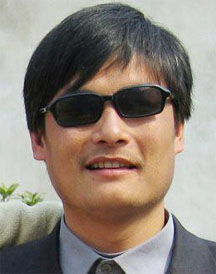BEIJING/WASHINGTON, (Reuters) – Blind Chinese dissident Chen Guangcheng made a dramatic plea for help in a cellphone call to a U.S. congressional hearing from his hospital bed in Beijing, raising the pressure on President Barack Obama over his administration’s handling of the case.

Chen, a self-taught legal activist, sheltered in the U.S. Embassy for six days until Wednesday. He left the embassy on the same day that U.S. Secretary of State Hillary of Clinton arrived in Beijing for talks aimed at improving economic and strategic relations between the two superpowers.
But within hours, Chen changed his mind about a deal that U.S. officials had said would allow him to relocate with his family and pursue his studies at a university.
Yesterday’s U.S. congressional hearing on Chen’s case took a dramatic turn when a witness called the dissident on his cellphone and relayed his appeal for help to members of Congress and the media.
“I want to come to the U.S. to rest. I have not had a rest in 10 years,” Chen said, according to a translation by Bob Fu, the president of Texas-based religious and human rights group ChinaAid. Fu held his cellphone to the microphone so that Chen could be heard, and translated his words.
Speaking from a Beijing hospital where he was reunited with his wife on Wednesday and where he was being treated for a foot injury, Chen said he wanted to meet Clinton to ask her for help and to thank her.
He said villagers who had helped him were “receiving retribution” and he was most concerned about the safety of his mother and brothers, according to Fu’s translation.
“I’m really scared for my other family members’ lives,” Chen said. “They have installed seven video cameras and are in my house.”
A pack of camera crews and reporters have been waiting outside Chen’s hospital in Beijing, kept away from the entrance by police. Radio Free Asia quoted Chen as saying he had received no visits from friends and his phone service was unreliable.
CRITICISM MOUNTS
U.S. officials have defended their handling of the case, but Republicans and Chen’s supporters were critical, saying the White House must ensure Chen’s safety. He sought refuge in the U.S. Embassy after escaping from house arrest in a village in rural Shandong province on April 22.
Republican presidential candidate Mitt Romney said if the reports were accurate, the U.S. Embassy “failed to put in place the kind of verifiable measures that would ensure the safety of Mr Chen and his family.
“If these reports are true, this is a dark day for freedom, and it’s a day of shame of the Obama administration,” Romney said during an event in Virginia yesterday as he campaigns for the November election.
China’s Foreign Ministry declined to comment on Chen’s request to leave the country and repeated its criticism of the way the United States had handled the issue as “unacceptable”. China has demanded an apology from the United States. Representative Ileana Ros-Lehtinen, chairwoman of the House of Representatives Foreign Affairs Committee, said: “It should have been obvious to U.S. officials all along that there is no way to guarantee Mr Chen’s safety so long as he is within reach of the Chinese police state.”
Some rights activists were also critical. “We have learned that when people come to the United States Embassy they are not in fact 100 percent safe,” said Reggie Littlejohn, president of the advocacy group Women’s Rights Without Frontiers.
“They can be turned over to the Chinese authorities from whom they were attempting to escape,” she told a news conference in Washington.
Fu of ChinaAid said Chen had told him that while he was at the embassy, U.S. officials conveyed a message that if he didn’t leave that day his family would be returned to the village where his family had lived “in hell” for years. Fu quoted Chen as saying: “I felt great pressure to leave.”
DECISION TO LEAVE
Chen, 40, is a legal activist who campaigned against forced abortions under China’s “one-child” policy.
